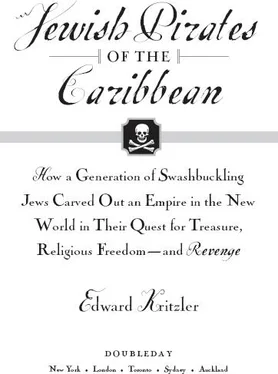Edward Kritzler - Jewish Pirates of the Caribbean
Здесь есть возможность читать онлайн «Edward Kritzler - Jewish Pirates of the Caribbean» весь текст электронной книги совершенно бесплатно (целиком полную версию без сокращений). В некоторых случаях можно слушать аудио, скачать через торрент в формате fb2 и присутствует краткое содержание. Год выпуска: 2008, ISBN: 2008, Издательство: Knopf Doubleday Publishing Group, Жанр: Старинная литература, на английском языке. Описание произведения, (предисловие) а так же отзывы посетителей доступны на портале библиотеки ЛибКат.
- Название:Jewish Pirates of the Caribbean
- Автор:
- Издательство:Knopf Doubleday Publishing Group
- Жанр:
- Год:2008
- ISBN:9780385528368
- Рейтинг книги:3 / 5. Голосов: 1
-
Избранное:Добавить в избранное
- Отзывы:
-
Ваша оценка:
- 60
- 1
- 2
- 3
- 4
- 5
Jewish Pirates of the Caribbean: краткое содержание, описание и аннотация
Предлагаем к чтению аннотацию, описание, краткое содержание или предисловие (зависит от того, что написал сам автор книги «Jewish Pirates of the Caribbean»). Если вы не нашли необходимую информацию о книге — напишите в комментариях, мы постараемся отыскать её.
Jewish Pirates of the Caribbean — читать онлайн бесплатно полную книгу (весь текст) целиком
Ниже представлен текст книги, разбитый по страницам. Система сохранения места последней прочитанной страницы, позволяет с удобством читать онлайн бесплатно книгу «Jewish Pirates of the Caribbean», без необходимости каждый раз заново искать на чём Вы остановились. Поставьте закладку, и сможете в любой момент перейти на страницу, на которой закончили чтение.
Интервал:
Закладка:
The seventeenth century commenced with Jews outlawed in most of Europe and the New World; it ended with their freedom. The participants in their liberation struggle are known. They were the children of refugees from the Inquisition who in the early 1600s, after having led underground lives in Spain and Portugal, settled in Amsterdam. Accepted by the Dutch as a valued merchant class, they raised their children in the free air of Holland, where a select group of them, following the example of their warrior rabbi, took it upon themselves to change things. Over the course of a half century of leadership (1623–75), they invaded the New World, battled the Inquisition, and orchestrated their people’s freedom.
 Chapter One
Chapter One 
COLUMBUS AND JAMAICA’S CHOSEN PEOPLE
M ay 1504, Santa Gloria, Jamaica: For nearly a year, Columbus had been stranded in Jamaica with a hoard of gold, a mutinous crew, and a few dozen teenage loyalists, some of whom were secret Jews. 1Alone, melancholy, and confined to his cabin by gout, the great explorer wrote his patron Queen Isabella a despairing letter. He feared that even if he defeated the mutineers, the governor of Santo Domingo, who had promised to send a rescue ship, wanted him dead.
So much had happened since he had been making the rounds of Europe, a would-be explorer going from king to king seeking royal backing for a promised quick passage west across the Ocean Sea to India and the wealth of the East. In 1486, at his first meeting with Spain’s royal couple, King Ferdinand, although intrigued by the plan, told Columbus the time was not opportune. They were in the midst of a war and could not seriously consider such an important matter until peace was restored. In parting, Queen Isabella counseled patience and awarded Columbus a retainer, promising they would meet again when the war was over.
On January 12, 1492, Columbus entered the royal quarters. He had been summoned a few days after Spain’s final victory over the Moors at Granada, and the queen had sent him money to buy new clothes and a mule to ride. Encouraged by her gift, Columbus was confident. He had honed his proposal into a detailed presentation, with maps and charts from the Jewish astronomer Abraham Zacuto, and quotes from the Bible and Greek sages supporting his view that the world was round, the oceans not large, and Japan lay three thousand miles to the west, across the Ocean Sea. Prepared for questions, he received none.
After an unsettling silence, Ferdinand spoke. Victory over the Moors had emptied the treasury, he said. Moreover, he could not abide Columbus’s demand for hereditary rule over lands he might discover. The queen, his admirer, said nothing. The meeting broke up and Columbus left, angry and disgusted. All this time he had waited for the war to end. Now that it had, Ferdinand was pleading poverty. Pausing briefly in the corridor, he informed the king’s treasurer that he was leaving for France where Bartholomew, his younger brother, was arranging an audience with the king. If that monarch wasn’t interested, he would cross the channel to meet with the English king. He would not be denied his dream, one that, as Cervantes wrote of Don Quixote, “He hugged and would not part with even if barefoot friars had begged him.” 2
Before Columbus rode past the gates of Santa Fe, the royal treasurer, Luis de Santangel, sought and was granted an audience with Queen Isabella. The royal chronicler noted, “[Santangel] appeared distressed as if a great misfortune had befallen him personally.” 3He had good reason: Santangel was a secret Jew, and as a member of the royal court, he was aware his people were about to be expelled from Spain. There were upward of a half million Jews in the country they had called home since the time of Christ. Where would they go? India? China? Perhaps the explorer Columbus would discover a new land somewhere. Santangel and other secret Jews in the royal service hoped Columbus’s voyage would provide an answer.
The Inquisition mandated that Jews, under penalty of death, must either leave or convert to Catholicism. Santangel, like many others, had converted and became a New Christian. If discovered Judaizing, the converts were liable to be burned at the stake. The Santangel family, long established in Spain, was among the first targets of the Inquisition. Luis’s cousins had gone up in flames in Saragossa, and only the intervention of Ferdinand had prevented Luis from suffering the same fate. 4
Santangel addressed the queen. He was astonished, he told her, “to see Her Highness who has always shown such resolute spirit in matters of great consequence, should lack it now for an enterprise of so little risk for so vast a gain.” He spoke to the queen of the wealth to be acquired, and the great service she would render to God, “all for the price of a few caravels [ships].” Alluding to Columbus’s plan to seek royal backing elsewhere, he cautioned Isabella, “It would be a great damage to Her Crown and a grave reproach to Her Highness if any other prince should undertake what Columbus offered Her Highness.” If money was a consideration, Santangel said, he would be glad to finance the fleet himself.
A mounted messenger caught up with Columbus as he was crossing the Bridge of the Pines, seven miles from Santa Fe, and bade him return. Later that day, with all parties again gathered in the royal quarters, the king informed Columbus that the Crown would sponsor his Enterprise of the Indies, and meet his demands. No mention was made of hereditary title. Two months later, it was still a stumbling block in his negotiations when an event occurred that made its inclusion mandatory.
On the morning of March 31, 1492, Columbus was in his room in Santa Fe overlooking the main square when the sound of trumpets brought him to his balcony. Below, the town crier, flanked by mounted guards, read the expulsion order of the Inquisition: Jews had four months to leave. After that, any “caught in Our domains will be punished without trial by death, and seizure of property.” 5The Jews of Spain had been threatened with expulsion before. Rulers since the Visigoths had used this threat to extract more money from them. A period joke compared the Jews to a “money box” that you break open when you need money. But this time it was different: The Church was involved.
To the Jews of the royal court who supported Columbus, the expulsion order made it essential that Columbus hold out for hereditary rule. If no Asian kingdom welcomed Jewish refugees, Columbus, as the ruler of a new land, would be able to provide a haven for Spanish Jews.
It is thought that Columbus himself was a descendant of Spanish Jews, the Colón family, who had converted and moved to Genoa a century before on the heels of the Massacre of 1391. Some even contend he was a Cabalist. Whatever his genealogy, he was in sympathy with the People of the Book, and they with him. In his early years, in Portugal and Spain, he lived in a largely Jewish and New Christian world of navigators, cartographers, astronomers, and mathematicians. While others looked askance at this wandering sailor and laughed at his dream, Iberian Jews and conversos assisted Columbus in developing his Enterprise of the Indies. In their learned circles, they dealt with a round world. Church geography did not apply to them. 6
On April 17, Columbus agreed to the Capitulations of Santa Fe, which limited his rights to lifetime rule. Two weeks later, this ruling was reversed, and Columbus was granted hereditary rule. No account exists of the final negotiations, but it is likely that court Jews, facing the forced exile of their people, counseled Columbus to hold firm to his demand. One imagines a scene in the royal chambers with Santangel persuading the royals that the explorer’s demand should not trouble them. If his voyage were successful, Columbus and his crew of ninety men could not possibly subdue one of the powerful Asian nations. On the other hand, if he took possession of a few islands along the way, the Crown would benefit by having way stations for Spain’s trading ships plying the shortcut passage to the wealth of the East.
Читать дальшеИнтервал:
Закладка:
Похожие книги на «Jewish Pirates of the Caribbean»
Представляем Вашему вниманию похожие книги на «Jewish Pirates of the Caribbean» списком для выбора. Мы отобрали схожую по названию и смыслу литературу в надежде предоставить читателям больше вариантов отыскать новые, интересные, ещё непрочитанные произведения.
Обсуждение, отзывы о книге «Jewish Pirates of the Caribbean» и просто собственные мнения читателей. Оставьте ваши комментарии, напишите, что Вы думаете о произведении, его смысле или главных героях. Укажите что конкретно понравилось, а что нет, и почему Вы так считаете.












